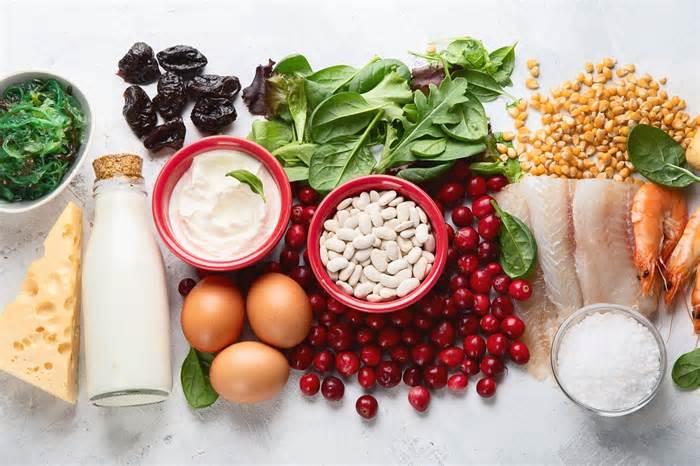What is Iodine in Food?
Iodine is an important mineral, although few food sources are rich in it. That is why many people around the world are at risk of developing a deficiency. Foods rich in iodine include seaweed, dairy, tuna, shrimp, and eggs.
Iodine is a mineral found in some foods. The body needs iodine to make thyroid hormones. These hormones control the body’s metabolism and many other important functions. The body also needs thyroid hormones for proper bone and brain development during pregnancy and childhood.
Iodine is an essential mineral that plays a key role in the synthesis of thyroid hormones. Without this element, the thyroid gland cannot produce enough hormones, which can lead to various health conditions such as goiter, hypothyroidism, and hyperthyroidism. Research shows that globally, nearly 2 billion people are deficient in iodine. Although iodine is found naturally in many foods, many of us do not get enough of it. In this article, let’s take a look at the most common iodine rich foods.
What Exactly is Iodine?
What is iodine? Also called iodide, iodine is a type of mineral that occurs naturally in the soil of the earth and in the waters of the ocean. Many plant-based foods and salt water contain iodine, and this mineral is most available in iodized salt. It is important to include enough iodine in the diet.

What Foods Are Rich in Iodine?
Experts recommend at least 150 micrograms of iodine per day for healthy adults. This may be higher or lower depending on your specific medical conditions, or if you are pregnant or breastfeeding. Therefore, you can include the following foods in your diet and possibly prevent iodine deficiency.
Shrimp
Shrimp absorb iodine that is naturally present in seawater. This makes it a good choice for a food rich in iodine.
When it comes to the Daily Value, 3 ounces of shrimp contains about 35 mcg of iodine (23% of the recommended intake).
Fruits
Fruits like prunes and berries contain iodine.
10 dried prunes contain approximately 26 mcg of iodine, which is approximately 18% of the daily requirement. The level of fiber, potassium, iron and vitamin K makes this a healthy food option in all aspects.
Blueberries contain 400 micrograms of iodine in just four ounces. That equates to more than 250% of your recommended daily intake.
However, this concentration of iodine may not be available in all places as the element is not distributed equally throughout the world.
Also Read: Thyroid Disease Causes, Symptoms And Treatment
Corn
A single cup of corn will provide 28 mcg of iodine, which is about 20% of what your body needs.
It adds to the good amounts of fiber, B vitamins, and protein that corn offers.
Iodized Salt
A little salt is good for your palate and for your health.
A quarter teaspoon of salt contains approximately 71 mcg of iodine. Add it to your cooking in a moderate amount. Also, for people with high blood pressure, please consult with your doctor before increasing the amount.
Dairy
Milk, yogurt, and cheese are a good way to get iodine if you are a vegetarian.
A cup of milk, after reducing fat, contains 55 mcg of iodine. You can have it in your chai or coffee.
One ounce of cheddar cheese offers approximately 12 mcg of iodine. However, different types of cheese have different amounts of iodine. Check the label while shopping. Also, cheese is quite high in calories, so be careful with the quantity.
Yogurt is another great dairy option to go with your granola. It has more than 150 mcg per cup. That means you can meet all of your daily iodine needs at the end of breakfast!
Seaweed
Seaweed is by far one of the best sources of foods rich in iodine. One leaf, that is, one gram of seaweed, contains up to 2984 mcg of iodine.
Kombu is an edible seaweed that is generally used to make dashi, a Japanese soup broth. According to a 2014 study, kombu contains approximately 2523.5 mg / kg of iodine, which is more than wakame and nori.
Wakame is a brown seaweed that is mainly used in miso soup. It is found to have approximately 139.7 mg / kg of iodine.
Nori is a red seaweed and is typically used in sushi. Compared to other algae, nori contains very less iodine (36.9 mg / kg).
You can add seaweed to your sushi, salads, or make a sandwich with it.
Note that iodine content varies in algae, as iodine concentrations continue to change throughout the world.
Poultry
Eggs are a rich source of protein, vitamin E, vitamin A, and various antioxidants.
A cooked egg also provides about 12 micrograms of iodine, almost 10% of what your body needs every day. So go ahead and add it to your breakfast, lunch, or dinner and get the needed boost!
Also Read: 7 Amazing Health Benefits of Iodine
Vegetables
Very few vegetables contain noticeable amounts of iodine.
Some include potatoes, green leafy vegetables, and onions. Potatoes were considered a source of iodine during World War II.
You can add vegetables to your meat-based recipes for a balanced meal.
Beans
For those who love beans, these foods are a good source of iodine.
One cup of navy beans provides 64 mcg of this element, which is more than 40% of your daily requirement. This is in addition to the dietary fiber and several key minerals that the body needs.
Fish
Fish like tuna and cod are rich in iodine.
3 ounces of tuna, canned in oil and drained, provides 17 mcg of iodine. Tuna is also rich in potassium, magnesium, and selenium, along with beneficial fatty acids that can protect heart health.
3 ounces of baked cod contain approximately 99 mcg of this nutrient. That’s more than 65% of your daily requirement for this nutrient, and cod also has high levels of beneficial omega-3 fatty acids.
You can add these fish to many dishes such as curries, stews, and tacos.
How Much Iodine is in a Teaspoon of Salt?
Iodized salt in the US contains 45 micrograms of iodine per gram of salt. The recommended daily intake for adults is 150 micrograms, which can be obtained from about half to three-quarters of a teaspoon of table salt.
Why is Iodine Good for?
The most important role of the iodines is to ensure the proper functioning of the thyroid. It helps regulate the production of the thyroid hormones thyroxine (T4) and triiodothyronine (T3). Getting enough iodine is essential to prevent low thyroid hormone production and hypothyroidism.
Is Iodine Good for Skin?
Iodine regulates moisture levels in the skin and helps heal cuts and scars through cell regeneration. Iodine also regulates the hormones responsible for acne breakouts.
Can I Drink Iodine?
When taken orally: Iodine is likely safe for most people when taken at doses less than 1,100 mg per day. Long-term use of iodine in large amounts may not be safe.

